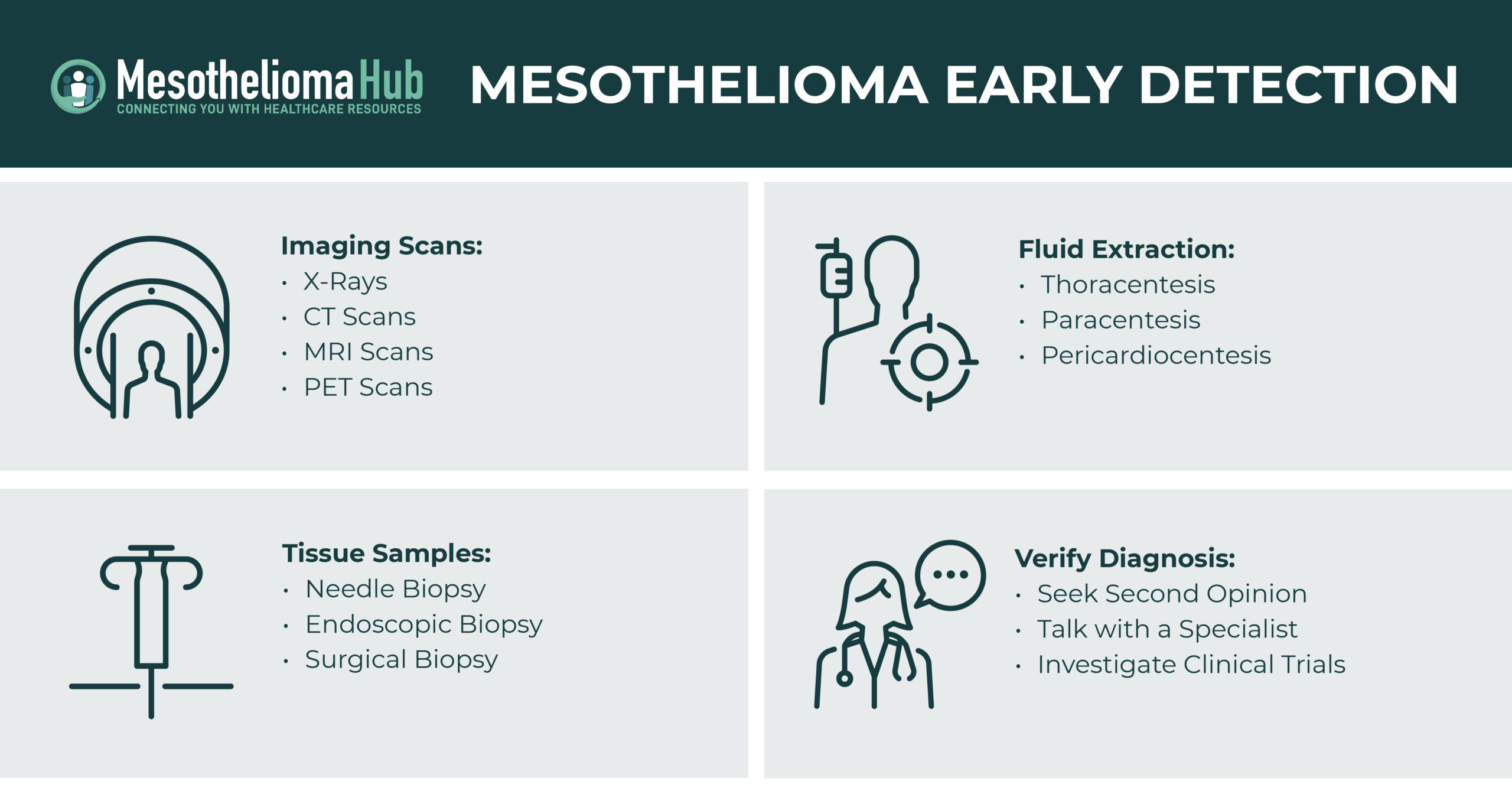Mesothelioma / Mesothelioma Early Detection
How Early Can Mesothelioma be Detected?
Mesothelioma often isn’t diagnosed until stage 3 or 4 with late onset of symptoms occurring after up to 60 years. Mesothelioma early detection tests should be done frequently for people who know they have been exposed to asbestos, which causes mesothelioma.
Get Free Mesothelioma Guide

Mesothelioma Early Detection and the Warning Signs
If you’re facing symptoms that worry you, particularly those resembling mesothelioma, it’s crucial to take action and detect mesothelioma early. As many already know, mesothelioma is an aggressive cancer forming in the lungs, abdomen, heart, or testicles before spreading throughout the body. Catching mesothelioma is essential for a patient’s prognosis, yet it is difficult to diagnose. However, detecting mesothelioma is challenging, as tests might yield ambiguous results due to similarities with other cancers. Mesothelioma’s latency period can span up to 60 years before symptoms emerge, emphasizing the need for early identification to curb its advancement.
The most common early mesothelioma symptoms may include persistent cough, chest pain, and difficulty breathing. Since it most often begins in the chest, it is common for a person could experience respiratory discomfort and even be diagnosed with a respiratory disorder instead of mesothelioma. If you know you were exposed to asbestos at one time or another, receiving mesothelioma early detection tests could give you more time to seek treatment.
Mesothelioma has no cure, but some treatment options have shown success for some patients. By reading further, you’ll delve into some of the key aspects of mesothelioma early detection, including techniques, how early detection impacts treatment outcomes, and whether a cure is possible if caught early. Gain insights into screening methods, the crucial role of timely identification in treatment, and the evolving landscape of mesothelioma management.
Screening and Diagnostic Techniques for Mesothelioma Early Detection
Mesothelioma early detection tests can involve a variety of screenings. A combination of screenings and diagnostic techniques can be used for early detection, including imaging scans and biopsies of potential cancerous tissues. Imaging tests like X-rays, CT scans, MRI scans, and PET scans may all be used to view the inside of the body. Doctors may look for abnormalities around the lungs and the lining surrounding them. A standard X-ray may show pleural thickening or fluid buildup around the lungs, which could lead to further investigations into why the fluid is piling up.
After imaging scans are done, the next step could be a biopsy. A biopsy of either blood, tissue, or fluid samples may confirm or deny a mesothelioma diagnosis. A thoracentesis, paracentesis, or pericardiocentesis can test fluid buildup in the lungs. All three remove fluid from the body with a needle, and which procedure is done depends on the location of fluid extraction.
Tissue biopsies may involve the removal of tissue for further sampling through a needle, endoscopic, or general surgery. A needle is the least invasive form and doesn’t require anesthesia for the patient. Using an endoscopic camera allows doctors to view the body, examine suspicious areas, and take a tissue sample if needed. General surgery can be done when other biopsies haven’t been conclusive enough. Opening up the body further to collect larger portions of tissues may be needed.
The Impact of Early Detection on Mesothelioma Treatment
Early detection of mesothelioma is key for all people with this form of cancer. There aren’t many mesothelioma treatments, but there are more options in the early stages of the disease. When the tumor is localized to one area, surgery may be the best option to remove a majority of the cancerous mass. The usage of chemotherapy and radiation therapy are often used throughout all stages of mesothelioma. They can be used for both curative and palliative care depending on the wishes of the patient seeking treatment. Other treatments, such as immunotherapy, medications, and complementary treatments, may be used depending on your form and type of mesothelioma.
The average lifespan for a person with mesothelioma can be anywhere between one to two years, with some people living many years after diagnosis. Mesothelioma typically grows fast, spreading throughout the body and limiting the amount of time patients can seek effective treatment. Early detection of mesothelioma may significantly improve a person’s prognosis as their access to all treatments is wide open. You should seek help from a mesothelioma specialist or other doctors to undergo cancer screenings if you have been exposed to asbestos.
Can Mesothelioma Be Cured if Caught Early?
Unfortunately, mesothelioma cannot be cured even when caught early, a depressing thought, to say the least. However, mesothelioma detected in the early stages of the disease does have a positive prognosis compared to treatment in other stages. Being able to fight the cancer in one area rather than in multiple areas around the body allows the treatment to be more successful. Awareness of mesothelioma symptoms and warning signs could help you self-diagnose before seeking medical attention. If you know you have been exposed to asbestos, it is imperative to receive regular mesothelioma detection tests. These measures can ensure you are mesothelioma-free or allow you to catch the cancer early enough. Don’t wait until it’s too late. Make an appointment to get your mesothelioma screening done.
Mesothelioma Support Team
Mesothelioma Hub is dedicated to helping you find information, support, and advice. Reach out any time!
